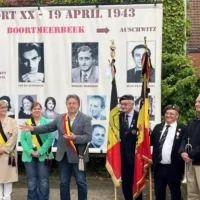Eeklo (Brussels Morning Newspaper) – The Orthodox religious leader of theFrancis , especially during hisexchanges , says the doctor .– The Orthodox religious leader of the Benelux has met Pope Francis several times, including during his frequent exchanges with Athenagoras Peckstadt, originally from Eeklo. “Compared to his predecessors, Francis’s simplicity was truly striking,” says Metropolitan Athenagoras Peckstadt.
On the occasion of the pontiff’s passing, Metropolitan Peckstadt took a moment to reflect on Pope Francis. He emphasized that the late pope distinguished himself from his predecessors by a much simpler approach, preferring modest spaces to the official Vatican apartments.
Peckstadt spoke of the Pope’s active engagement in ecumenical dialogue, particularly on issues related to Orthodox traditions such as divorce and the marriage of priests—the latter, however, rejected by the Catholic Church. He described Francis as a reformist pope, more focused on the needs of ordinary people than on institutional dogmas.
« He was 88 years old and had a good life. Given his health, his death is not entirely a surprise, »
he said of the Pope’s passing.
« I caught Francis’s attention by telling him about the possibility, in the Orthodox Church, of remarriage after marital breakdown. He found this very positive. He also supported the idea of the priesthood for married men, even though he was unable to make it a reality in his Catholic Church. »
The Metropolitan had also met the two previous popes, John Paul II and Benedict XVI. He recalls that Francis’s simplicity stood out in comparison:
« He received us in the refectory of the Santa Marta house, where the cardinals eat, while his predecessors invited us to a meal in their private apartments, at the very top of the Vatican. »
« If Benedict was the great theologian who defined the doctrine of the Church, then Francis was the man of the field, the one who cared about the man in the street, about the common good, much more than about theory. »
« I will remember him as a man who wanted to reform, including his own office as pope. He did not see himself as a supreme prelate, but as the pastor of the city of Rome. He did not see his universal role as an exercise of power. »
The coming weeks will be marked by speculation about Francis’s successor. Athenagoras Peckstadt considers the cardinal of Manila, Philippines, a strong contender:
« During the synod, he impressed with his qualities as a moderator. But the Vatican Secretary of State, Pietro Parolin, as well as the Congolese cardinal Fridolin Ambongo, archbishop of Kinshasa, are also mentioned. It is often said that one enters the conclave as a papabile , that is, papal, and leaves as a cardinal. What is certain is that the next pope will be neither a Benedict nor a Francis. »
Religious and demographic context of Orthodox-Catholic relations in the Benelux:
Religious practices in the Benelux region have historically been dominated by Catholicism, although this tradition is now in sharp decline. In Belgium, approximately 52% of the population identifies as Catholic, while in the Netherlands, this figure falls to 20%. Orthodox Christians represent a minority of 2 to 3%, mainly from Romanian, Greek, and Russian immigration.
Since 2013, the Orthodox Church in the Benelux has been led by Metropolitan Athenagoras Peckstadt, who is under the jurisdiction of the Ecumenical Patriarchate of Constantinople. He works to promote interfaith understanding between Catholics and Orthodox Christians.
As Pope from 2013 to 2023, Francis pursued a policy of ecumenical harmony, notably with his historic meeting in 2014 with Patriarch Bartholomew I, a significant milestone in his relations with the Orthodox. In Belgium, Peckstadt maintains strong working relationships with Catholic institutions, notably through joint refugee assistance programs.
However, theological differences remain, particularly over the primacy of the Pope and priestly celibacy. A policy adopted by the Vatican in 2016 allowed Anglican priests to become Catholics while retaining their wives, thus opening a new debate on the issue of married clergy in Catholicism.
The rise of secularization and the diversification of religious identities have transformed interfaith relations. A 2021 Pew Research study found that less than 10% of Belgians regularly attended religious services, although Catholic and Orthodox institutions maintain their organizational ties.
The death of Pope Francis has rekindled debates on the possible decentralization of Vatican governance and the continuation of his ecumenical initiatives, two central focuses of his pontificate.




